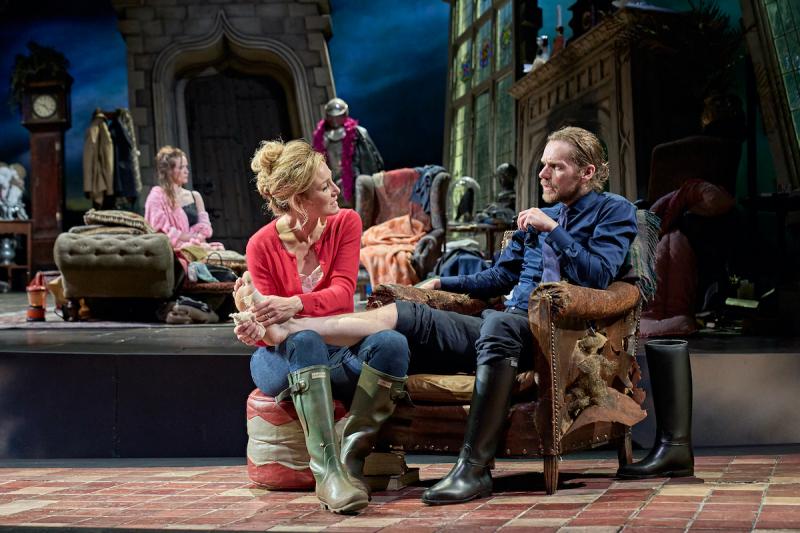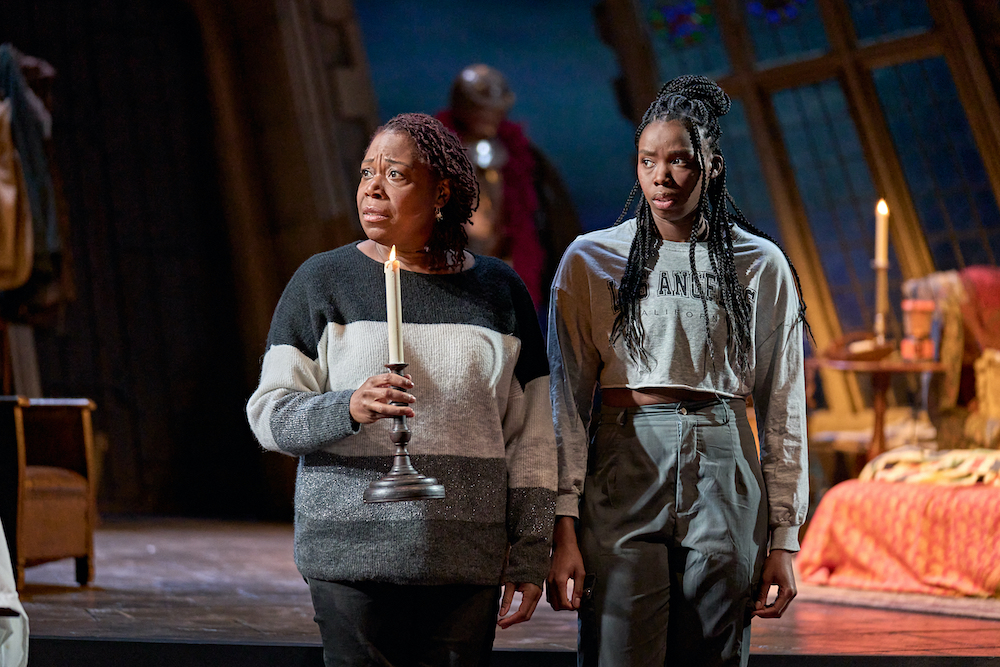Manor, National Theatre review – ambitious, but unconvincing | reviews, news & interviews
Manor, National Theatre review – ambitious, but unconvincing
Manor, National Theatre review – ambitious, but unconvincing
Moira Buffini’s state-of-the-nation, climate-change play runs into the doldrums

After all the tides of monologue plays have ebbed, British new writing is now paddling in the pools of state-of-the-nation drama.
Set in the great hall of an ancient manor house, the story centres on Diana, the lady of the domain, who inherited this venerable, now rapidly decaying, pile but is currently in deep trouble — bookings for the Wedding Barn are down and neither she nor her equally decaying, and drug-addled, rock star husband Pete have the money to survive. As their daughter Isis struggles to make sense of the family accounts, the whole country around them is being whipped by a savage biblical storm, which throws thunder, lightning and flood water at the estate, submerging the country lanes and devastating the fields. Yes, it’s a gothic moment in which the building’s supernatural nature taps at the edge of our consciousness — here be ghosts.
The howling wind and torrential rain also blow in some unexpected guests, which creates a scenario familiar from countless Agatha Christie country house mysteries. You know the kind of thing: odd strangers, a dead body and a power cut. The arrivals include Dominic, the aged vicar, Ripley, a black NHS nurse and her teenage daughter Dora, soon followed by Ted (Evans), a right-wing extremist, Anton his mixed-race henchman and Ruth, a blind fascist academic. Plus Perry, a troubled unemployed man whose caravan has been trashed by the storm. As Ted, a charismatic fanatic who leads a group called Albion, attempts to shake off his fiancé Ruth, recruit Perry and take over the manor as his new HQ, resistance is led by Ripley, while Dora befriends the lonely Isis.
As a dozen emotional currents ripple around the relationships of these individuals, the play’s big ideas blow through the piece. As well as climate change, which is seen as the Earth’s revenge on white European colonial capitalism, and which maroons the characters by cutting off their phone and internet connections, the theme of national identity stomps its way into this hallowed dusty English hall. Ubermensch Ted and Ruth advocate a terroristic third crusade against the Muslims, while also recruiting people from diverse ethnic backgrounds in order not to appear racist. Perhaps the best passages are when Evans’s Ted manipulates his ardent follower Anton or tries to recruit Perry, showing a canny ability to psychologically exploit human weakness and desperation.
But the trouble with Manor is not only that its central themes gets drowned in a flood of incidental material — from the state of the health service to lesbian love — but also that it can’t make up its mind whether it is a farcical comedy or a serious anatomy of our septic isle. While some of Buffini’s eccentric characters come vividly to life, her Lady Diana feels so unconvincing that even Nancy Carroll struggles to make her credible. Her relationship with Pete seems unnecessarily antagonistic and her rapport with her daughter cool to the point of freezing — all this makes it hard, if not impossible, to sympathise with Diana or her family, which fatally cools the dramatic temperature.
 By contrast, Evans manages to make Ted a good study of enigmatic political leadership. Is he really a convinced white supremacist, or is he using the far-right to advance his lust for power? Although he is ambivalent about his fiancé Ruth, he cannot conceal his old-fashioned masculinist views about women’s place in society and his attraction to Diana is based on self-interest as much as sexual desire. By the end, the debate about truth and fake news reaches a climax, as Evans lends his character’s half-baked ideas and odd moments of perception a welcome intensity.
By contrast, Evans manages to make Ted a good study of enigmatic political leadership. Is he really a convinced white supremacist, or is he using the far-right to advance his lust for power? Although he is ambivalent about his fiancé Ruth, he cannot conceal his old-fashioned masculinist views about women’s place in society and his attraction to Diana is based on self-interest as much as sexual desire. By the end, the debate about truth and fake news reaches a climax, as Evans lends his character’s half-baked ideas and odd moments of perception a welcome intensity.
But what about the good people? Ripley and Dora — played by Michele Austin and Shaniqua Okwok (pictured above) — arrive as a comic turn: south Londoners appalled at the realities of living in the English countryside. But they gradually turn into avenging angels, determined to expose Ted’s misogyny and terroristic plans. But despite their best efforts, the play text gives them too little to work with, and the impression they give of embattled virtue is muddied by the more colourful characters who surround them, from David Hargreaves’s Dominic and Owen McDonnell’s Pete to Peter Bray’s Anton and Edward Judge’s Perry. Both Isis (Liadán Dunlea) and Ruth (Amy Forrest) get lost in tempest.
It would be unfair not to acknowledge that there are some moments when Buffini’s writing takes off, as when Pete indulges in his fantastical imaginings, or when Ted and Anton explore the Roman past of Anglo-Saxon England, when black people walked upon the fabled green valleys and fields, but there is also something very unfocused about the final effect of the play. It’s almost as if it is afraid to be fully serious and passionate about the issues it discusses and prefers to just touch on a nerve, as in the use of the P word, and then get distracted by another subplot. This gives the evening the feeling of a sitcom, a kind of welfare populism in which the audience is never surprised, startled or strained. It’s a piece whose gender and race politics should blaze; instead they barely smoulder.
So although the production, directed by Moira’s sister Fiona Buffini and designed by Lez Brotherston, has an entertainingly gothic feel, with the huge ancestral hall exuding the vapours of ghosts past and present, the dust of history and of decay, the action is never gripping enough and the central family too absent and too unattractive to hold our interest. As a comic satire it is only fitfully funny, and as a state-of-the-nation drama it never gives itself enough room to thoroughly explore the ideas it introduces. Despite some violent moments, and lots of noisy acting, Manor lacks the feeling that there is something vital at stake here, and its portrayal of ugly ideas is never seductive enough to be really dangerous. With its clichés and predictability, this is surely a missed opportunity.
rating
Explore topics
Share this article
The future of Arts Journalism
You can stop theartsdesk.com closing!
We urgently need financing to survive. Our fundraising drive has thus far raised £49,000 but we need to reach £100,000 or we will be forced to close. Please contribute here: https://gofund.me/c3f6033d
And if you can forward this information to anyone who might assist, we’d be grateful.

Subscribe to theartsdesk.com
Thank you for continuing to read our work on theartsdesk.com. For unlimited access to every article in its entirety, including our archive of more than 15,000 pieces, we're asking for £5 per month or £40 per year. We feel it's a very good deal, and hope you do too.
To take a subscription now simply click here.
And if you're looking for that extra gift for a friend or family member, why not treat them to a theartsdesk.com gift subscription?
more Theatre
 Edinburgh Fringe 2025 reviews: I'm Ready To Talk Now / RIFT
An intimate one-to-one encounter and an examination of brotherly love at the Traverse Theatre
Edinburgh Fringe 2025 reviews: I'm Ready To Talk Now / RIFT
An intimate one-to-one encounter and an examination of brotherly love at the Traverse Theatre
 Top Hat, Chichester Festival Theatre review - top spectacle but book tails off
Glitz and glamour in revived dance show based on Fred and Ginger's movie
Top Hat, Chichester Festival Theatre review - top spectacle but book tails off
Glitz and glamour in revived dance show based on Fred and Ginger's movie
 Edinburgh Fringe 2025 reviews: Alright Sunshine / K Mak at the Planetarium / PAINKILLERS
Three early Fringe theatre shows offer blissed-out beats, identity questions and powerful drama
Edinburgh Fringe 2025 reviews: Alright Sunshine / K Mak at the Planetarium / PAINKILLERS
Three early Fringe theatre shows offer blissed-out beats, identity questions and powerful drama
 The Daughter of Time, Charing Cross Theatre review - unfocused version of novel that cleared Richard III
The writer did impressive research but shouldn't have fleshed out Josephine Tey’s story
The Daughter of Time, Charing Cross Theatre review - unfocused version of novel that cleared Richard III
The writer did impressive research but shouldn't have fleshed out Josephine Tey’s story
 Evita, London Palladium review - even more thrilling the second time round
Andrew Lloyd Webber's best musical gets a brave, biting makeover for the modern age
Evita, London Palladium review - even more thrilling the second time round
Andrew Lloyd Webber's best musical gets a brave, biting makeover for the modern age
 Maiden Voyage, Southwark Playhouse review - new musical runs aground
Pleasant tunes well sung and a good story, but not a good show
Maiden Voyage, Southwark Playhouse review - new musical runs aground
Pleasant tunes well sung and a good story, but not a good show
 The Winter's Tale, RSC, Stratford review - problem play proves problematic
Strong women have the last laugh, but the play's bizarre structure overwhelms everything
The Winter's Tale, RSC, Stratford review - problem play proves problematic
Strong women have the last laugh, but the play's bizarre structure overwhelms everything
 Brixton Calling, Southwark Playhouse review - life-affirming entertainment, both then and now
Nostalgic, but the message is bang up to date
Brixton Calling, Southwark Playhouse review - life-affirming entertainment, both then and now
Nostalgic, but the message is bang up to date
 Inter Alia, National Theatre review - dazzling performance, questionable writing
Suzie Miller’s follow up to her massive hit 'Prima Facie' stars Rosamund Pike
Inter Alia, National Theatre review - dazzling performance, questionable writing
Suzie Miller’s follow up to her massive hit 'Prima Facie' stars Rosamund Pike
 A Moon for the Misbegotten, Almeida Theatre review - Michael Shannon sears the night sky
Rebecca Frecknall shifts American gears to largely satisfying effect
A Moon for the Misbegotten, Almeida Theatre review - Michael Shannon sears the night sky
Rebecca Frecknall shifts American gears to largely satisfying effect
 Burlesque, Savoy Theatre review - exhaustingly vapid
Adaptation of 2010 film is busy, bustling - and bad
Burlesque, Savoy Theatre review - exhaustingly vapid
Adaptation of 2010 film is busy, bustling - and bad
 Don't Rock the Boat, The Mill at Sonning review - all aboard for some old-school comedy mishaps
Great fun, if more 20th century than 21st
Don't Rock the Boat, The Mill at Sonning review - all aboard for some old-school comedy mishaps
Great fun, if more 20th century than 21st

Add comment